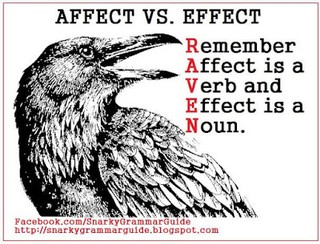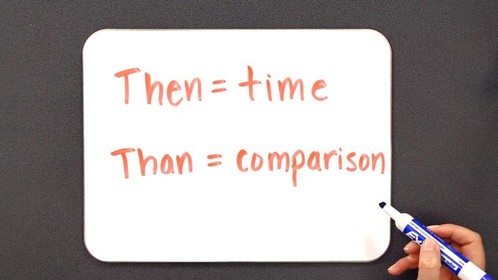Avoiding the Ill Effects of Misusing "Affect" - The Grammar-Us Blog - Grammar-Us
Main menu:
Avoiding the Ill Effects of Misusing "Affect"
 The words “affect” and “effect” can be confusing, even to us grammarians! I believe that’s because, depending on the context in which they are used, they can “role-
The words “affect” and “effect” can be confusing, even to us grammarians! I believe that’s because, depending on the context in which they are used, they can “role-
These are the most frequently used roles of “affect” and “effect”:
Affect = Verb, meaning “to produce a change.”
Example: His failing grade will affect his chances for getting into college.
Effect = Noun, meaning “the result of a cause.”
Example: The effects of the tornado will be felt for a long time.
When facing the “affect/effect” dilemma, I have devised a couple of tricks that help me to determine which one is correct in the context of the sentence I’m writing.
The first one is to remember that a verb is an action word, and “affect” starts with an “a,” just like “action.” Putting two and two together (in this case, the “a” in the two words “action” and “affect”), I can remember that, when the word is being used as an action, it needs to be affect.
I apply a similar thought process when deciding whether “effect” is the correct word to use. As stated above, “effect” means a result. The word “result” does not have an “a” anywhere in it, but it does have an “e.” Therefore, I can remember that the presence of an “e” in both words is a signal that, when I am trying to describe a result of something, I need to use the word with the “e” in it, which is effect.
Does this make sense? If not, perhaps you can devise similar tricks that prod your memory into the correct choice of words.
Two other words that can cause confusion are “then” and “than.” But fear not! I also have a trick for remembering which one of them is correct within the context of a sentence. First, the definitions of each:
Then = A point in time.
Example: If it rains, then the wedding will be moved indoors.
Than = A comparison word.
Example: Marlo’s apple is bigger than mine.
I look to the key words in the definitions of “then” and “than” to prod my memory as to which one is correct for the sentence I am writing. For “then,” the key word in the definition is time. Since “time” and “then” both contain an “e,” I relate them together and can remember that, when writing about the time in which something occurred, I need to use the word with the “e” – then. Similarly, the key word in the definition of “than” is compare. This word contains an “a,” and so does the word “than.” Therefore, whenever I wish to compare something, I need the word that contains the “a” – than.
- FRESH WRITING
- TWELVE ERRORS THAT MAKE A GRAMMARIAN GNASH HER TEETH
- THE WHYS AND HOWS OF WRITING AN EFFECTIVE CONSUMER LETTER
- FILLER WORDS: THE "JUNK FOOD" OF COMMUNICATIONS
- Pardon Me, Your Participle is Dangling!
- MAKE BETTER GRAMMAR A NEW YEAR’S RESOLUTION
- The Value Of Personal Letters
- How To Make Your Writing Flow
- How (And Why) To Tighten Up Your Writing
- Why Grammar Matters
- Time For Another Grammar Quiz!
- Editing: The "Make Or Break" Skill
- Proofreading: It Matters More Than You Think!
- Please Don't Ruin A Perfectly Good Tense!
- A Brave New Word
- Homophones: The Sequel
- Coulda, Shoulda, Woulda And Other Incorrectly Written Words
- More Homophones
- Time For Another Grammar Goof Quiz
- A Different Kind Of Colonoscopy (And Semi-Colonoscopy)
- Comparatives & Superlatives: The Good, The Bad, And The Ugly
- Either/Or, Neither/Nor: Decisions, Decisions!
- Let's Agree To Agree
- Avoiding Apostrophe Apocolypse
- Let's Pause To Honor The Comma!
- Three Speech Patterns That Can Compromise Professionalism
- A Hit Parade of Grammar Misses
- Negative Nancy Has Hijacked My Blog!
- Who Dat?
- Avoiding the Ill Effects of Misusing "Affect"
- How To Perfectly Use Six Irregular Verbs
- Random Ramblings
- Me, Myself and I: The Narcissist's Nightmare
- Confounding Compounds
- "All The World's A Stage...": Know Your Audience
- From The Department Of Redundancy Department: The Whole Entire Scoop On "Whole" And "Entire"
- Grammatically Challenged? There, Their, They're. It'll Be OK!
- "Its": It's a Special Exception
- We're Up And Running!